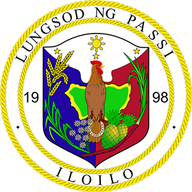
For more than two decades now, Passinhons have been celebrating the PINTADOS de PASÌ Festival, a festival reflecting the colorful Passinhon personality, their passionate and fearless drive for success and progress.
This festival in itself is a reflection of the rich Passinhon heritage. It retraces the legend and history of Passi, showing a close connection with the Visayan heritage.
Pintados was the term used by Spanish colonists to describe the tattooed indigenous Visayan people. They were found on the islands of Cebu, Bohol, Eastern part o Negros, Samar, Leyte and in the Visayan region. The word itself means “painted” and was first used during the Spanish colonization of the Philippines. The men are known for their tattoo art, which often covers their bodies and he who is bravest is painted most.
Grasping this concept, Pintados de Pasì was established to reflect the utmost bravery, passion and colorful personalities of Passinhons reflected through artistic and traditional body tattoo with elaborate geometrical designs painted all throughout the body of the Pintados de Pasì tribe members during the Tribal Competition.
Vigorous and aggressive dance-steps and body movements characterize the Pintados generic routine. Tribe members pain their whole bodies except the wrist and feet while women women wear tattoos only on one side of their arms. To the men, these tattoos serve as their “clothing”. The dance steps must follow the 7 dance steps of (Saot sa Rarug). The Pintados de Pasì Rhythm arranged by Mr. Jose Balcena is integrated in the music. Warriors symbolize that bravery and strength of the Passinhon personality but the gentle, creative and caring soul is reflected by the dainty and inspired movements of the female dancers. The dance routines also represent the unity that binds all Passinhons. More than the Tribal Competition that serves as the highlight of the festival, Pintados de Pasì also includes the Ginoo and Binibining Pintados Pageant, Karosa Parada, Body Painting Contest called Pinta Lawas and the Sinadya sa Suba which includes Laro ng Lahi.
Mostly a thanksgiving festival which was originally meant to commemorate the charter anniversary of Passi City. The dance reflects bountiful harvests to honor the One who granted bountiful blessings throughout the year.
Pintados de Pasì Festival was first held on March 1999 to celebrate the Cityhood Anniversary of Passi – the small, heart-shaped town beside the Jalaur River. RA 8469, “An Act Converting the Municipality of Passi in the Province of Iloilo into a Component City to be known as the City of Passi” was signed by former President Fidel V. Ramos, last January 30, 1998. It was ratified on March 14, 1998 following a plebiscite conducted by the Commission on Elections.
Every year, from then, Passinhons from all walks of life gathered to commemorate the brave and illustrious move of Passinhon leaders to push for the Cityhood and the unity of the entire community to accept change and evolve with the times. Thus, the Pintados de Pasì improves over the years. Pintados de Pasì is gathering of thanksgiving unifying the entire community for the bountiful blessing the Cityhood brings.

